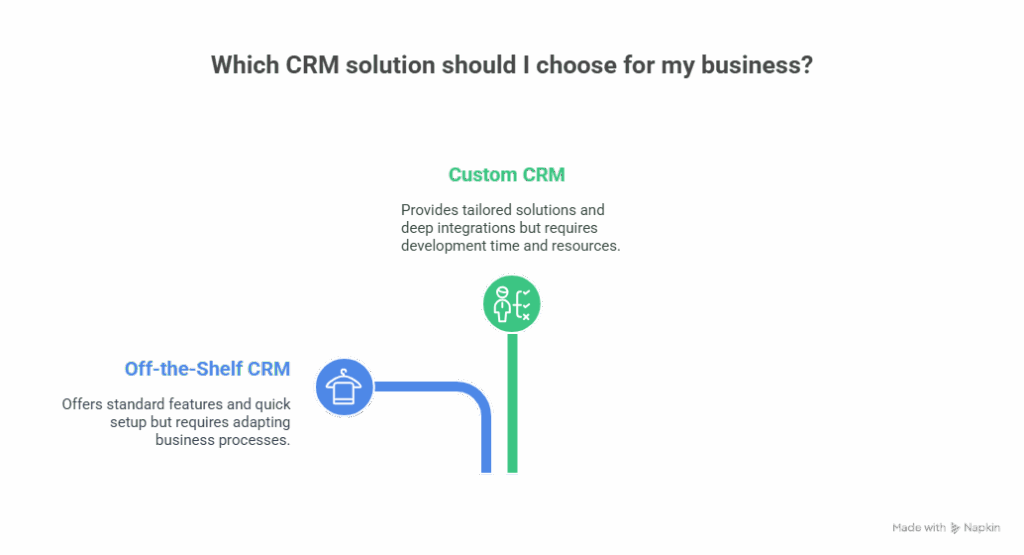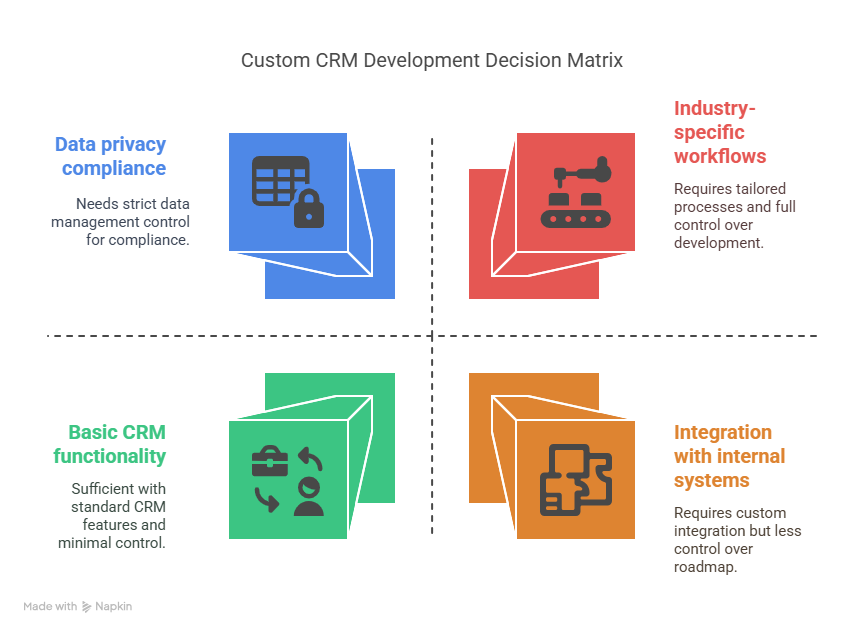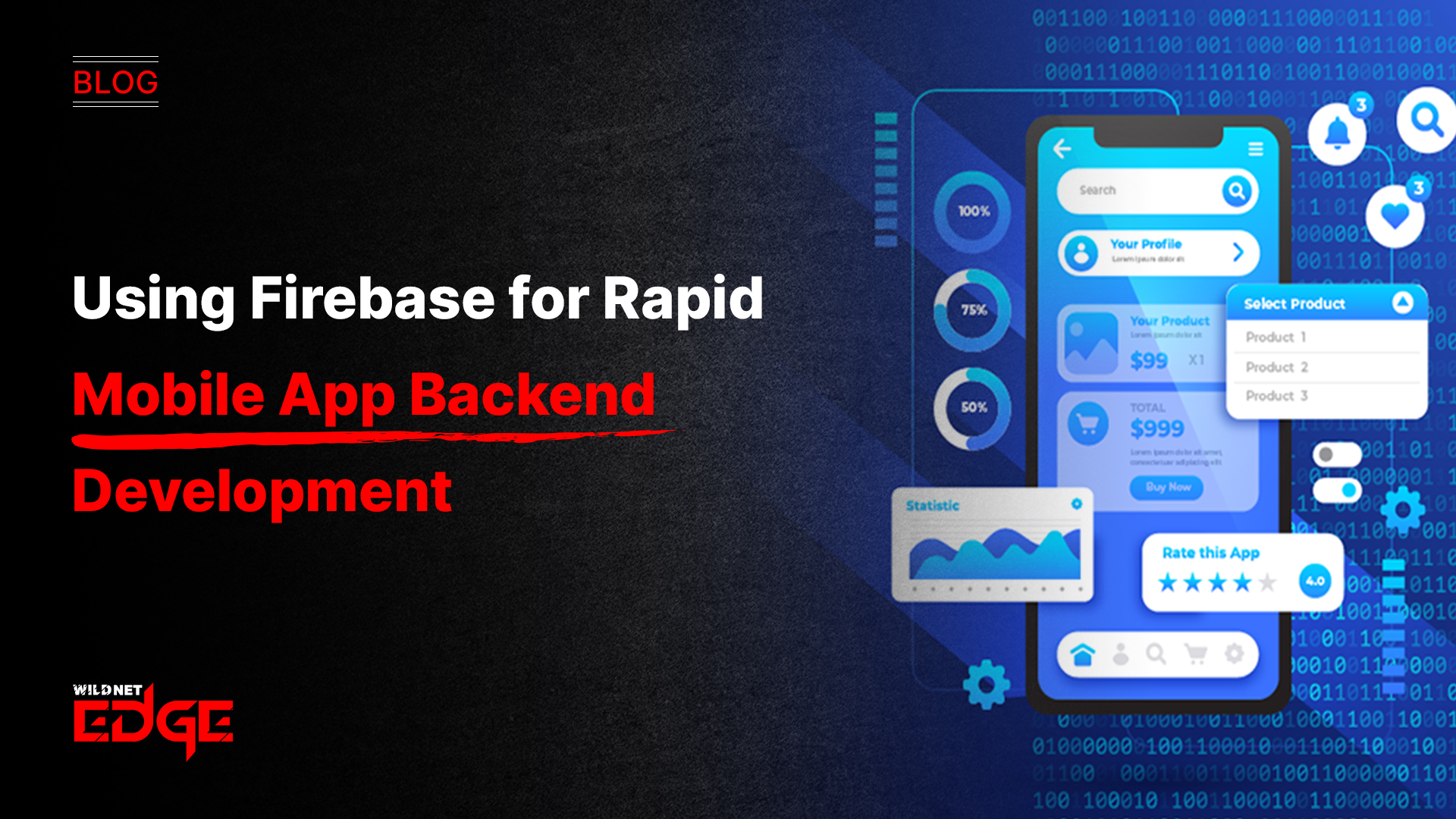Custom CRM Development vs Ready-Made Solutions: What’s Right for Your Business?
When your CRM starts getting in the way instead of helping, it’s time to rethink things. I’ve worked with enough growing teams to know that what works in the beginning doesn’t always scale.
Off-the-shelf CRM solutions can be quick wins until your workflows don’t fit, your data feels boxed in, and your team works around the system instead of with it. That’s when custom CRM development becomes more than a tech decision. It becomes a business move.
If you are confused about whether you need a custom CRM Development, this guide is for you. Let’s break down which option actually fits the way you work, and where you’re headed next.
What is a Custom CRM Software?
Custom CRM software is built specifically for the way your business operates, not how a generic platform thinks you should. It’s designed around your workflows, your teams, your data structure, and your customer journey.
Unlike ready-made tools, which offer standard features for a wide range of users, custom CRM development gives you control over everything: how leads move through the pipeline, what triggers follow-ups, how data is organized, and how reports are generated.
In short, it’s not about having more features. It’s about having the right ones, tailored to help your team move faster, stay aligned, and serve customers better.
How Does Custom CRM Differ from Off-the-Shelf CRM Solutions?

The biggest difference is control.
With a ready-made CRM, you adapt your business to fit the tool. With custom CRM software, the tool adapts to fit your business.
Off-the-shelf CRMs come with fixed modules, lead tracking, email workflows, and reporting dashboards. They’re built for the average user, not for your team, your pipeline, or your data structure.
Custom CRM development flips that. It gives you:
- Custom-built workflows that reflect how your teams actually sell and support
- Data fields, tags, and filters tailored to your operations
- Deep integrations with your tools, not clunky workarounds
- Dashboards that surface exactly what you want to track
It’s the difference between wearing a suit off the rack and one that’s tailored to fit you perfectly.
If your CRM is slowing your team down, making them work around its limitations, or forcing you into workflows that don’t feel right, that’s where custom makes all the difference.
Custom CRM vs Ready-Made CRM: A Quick Comparison
| Feature / Factor | Custom CRM Development | Ready-Made CRM Solutions |
| Fit for Your Business | Built around your exact workflows and needs | Generalized features for broad use cases |
| Customization | Fully customizable at every level | Limited customization within predefined limits |
| Scalability | Scales seamlessly as your business grows | Often requires expensive upgrades or plugins |
| Integration with Other Tools | Deep, native integration possible | Depends on existing plugins or third-party APIs |
| Ownership and Control | Full control over data, features, and roadmap | Data and updates managed by vendor |
| Implementation Time | Longer (requires planning and development) | Faster (out-of-the-box setup) |
| Upfront Investment | Higher initial cost | Lower initial cost, but may rise with scaling |
| Maintenance Responsibility | Requires in-house or external tech support | Handled by the software provider |
| User Experience (UX) | Tailored to your team’s habits and goals | Generic UX designed for mass adoption |
Pros and Cons: Custom CRM vs Ready-Made CRM Solutions

Custom CRM Development
Pros:
- Tailored exactly to your workflows and goals
- Scales as your business grows, without third-party constraints
- Enables deeper integration with internal systems
- Full control over features, data handling, and user experience
- No recurring license fees for unused features
Cons:
- Higher upfront investment
- Longer development time
- Requires ongoing technical maintenance or support team
Ready-Made CRM Solutions
Pros:
- Quick setup and time-to-value
- Lower initial cost, ideal for early-stage businesses
- Comes with built-in support, documentation, and updates
- Great for standardized, straightforward use cases
Cons:
- Limited customization and flexibility
- May include features you don’t need or miss ones you do
- Harder to scale with growing or complex teams
- May lock you into vendor-specific pricing and update cycles
- Less control over data and how the system evolves
When to Choose Custom CRM Development
Custom CRM development isn’t the default choice; it’s the right one when your business has moved beyond the basics.
Here’s when it makes sense to go custom:
- You’ve outgrown your current CRM.
If your team is using workarounds, external spreadsheets, or duplicate tools just to make things work, it’s a clear sign the system isn’t built for you anymore.
- You need processes that the market tools can’t support.
Industry-specific workflows, unique approval hierarchies, or non-standard sales cycles often don’t fit into boxed CRM templates.
- You want to own your roadmap.
With off-the-shelf solutions, you’re waiting on updates or paying extra for changes. Custom CRM software gives you control over what gets built, and when.
- You need deeper integration with internal systems.
Whether it’s a homegrown ERP, a proprietary quoting engine, or a complex inventory system, custom CRM lets you stitch everything together seamlessly.
- Data privacy, security, or compliance is a concern.
When you need full control over how customer data is stored, accessed, and audited, a custom solution can align precisely with your internal policies.
In short: if your CRM is creating friction instead of removing it, it’s time to think custom.
So, What’s Right for Your Business?
If you’re still deciding between building a custom CRM or going with a ready-made solution, the best answer lies in how complex your needs are and how much control you want over solving them.
Off-the-shelf CRMs work well when your processes are simple, your team is small, and speed is your priority. But once your operations start to feel boxed in by the tool, or you find yourself constantly working around limitations, that’s your sign.
Custom CRM development gives you something that’s built for you, not the average business.
At WildnetEdge, I work with teams that want to own their workflows, move faster, and scale without friction. If that’s where your business is heading, I’d be happy to explore how we can help you build the CRM that fits.
Let’s talk about what your CRM should really do, and then build it together.
FAQs
- Is custom CRM software better for small businesses or larger enterprises?
It depends on your growth stage and complexity. Smaller businesses with straightforward needs may find ready-made CRMs like HubSpot or Zoho sufficient. However, if you’re a growing company with unique sales cycles, industry-specific workflows, or the need to integrate deeply with other internal systems, custom CRM development often makes more sense. It becomes especially valuable when your current tool starts limiting what your team can do efficiently.
- Can a custom CRM integrate with my existing tools?
Yes. One of the biggest advantages of custom CRM development is the ability to build seamless, native integrations with the tools you already use.
- What are the long-term benefits of custom CRM development?
While the upfront investment is higher, the long-term benefits often outweigh the cost. You gain a CRM that fits perfectly into your operations, which reduces inefficiencies and increases adoption. You also avoid vendor lock-in, have full control over your data and roadmap, and can scale the system as your business grows, without paying for features you don’t use. Over time, this leads to better team performance, deeper customer insights, and higher ROI.
- What features should a custom CRM include?
A custom CRM should include only what your business needs. Common features of a custom CRM software include lead and deal tracking, sales automation, custom dashboards, workflow automation, integrations with your tools, and role-based access. Unlike off-the-shelf tools, custom CRM software lets you design features that match your exact workflows, without the clutter of unnecessary add-ons.

Nitin Agarwal is a veteran in custom software development. He is fascinated by how software can turn ideas into real-world solutions. With extensive experience designing scalable and efficient systems, he focuses on creating software that delivers tangible results. Nitin enjoys exploring emerging technologies, taking on challenging projects, and mentoring teams to bring ideas to life. He believes that good software is not just about code; it’s about understanding problems and creating value for users. For him, great software combines thoughtful design, clever engineering, and a clear understanding of the problems it’s meant to solve.
 sales@wildnetedge.com
sales@wildnetedge.com +1 (212) 901 8616
+1 (212) 901 8616 +1 (437) 225-7733
+1 (437) 225-7733















 ChatGPT Development & Enablement
ChatGPT Development & Enablement Hire AI & ChatGPT Experts
Hire AI & ChatGPT Experts ChatGPT Apps by Industry
ChatGPT Apps by Industry ChatGPT Blog
ChatGPT Blog ChatGPT Case study
ChatGPT Case study AI Development Services
AI Development Services Industry AI Solutions
Industry AI Solutions AI Consulting & Research
AI Consulting & Research Automation & Intelligence
Automation & Intelligence















